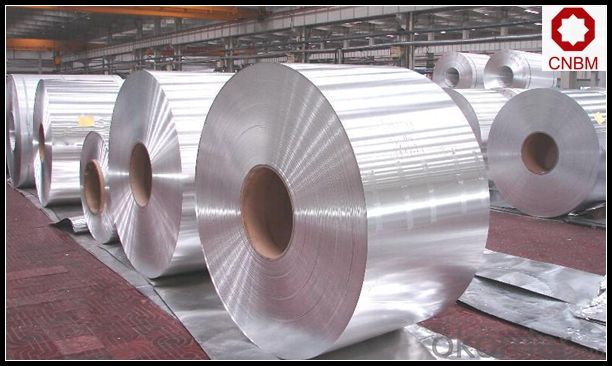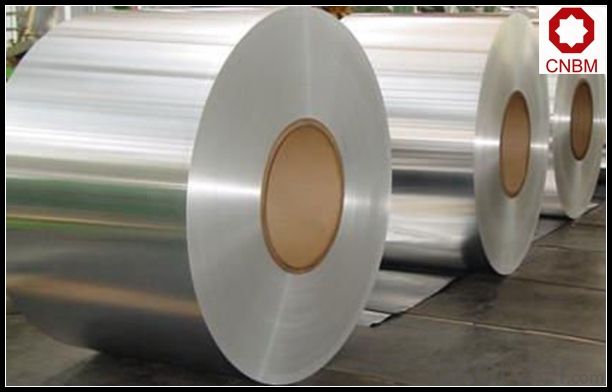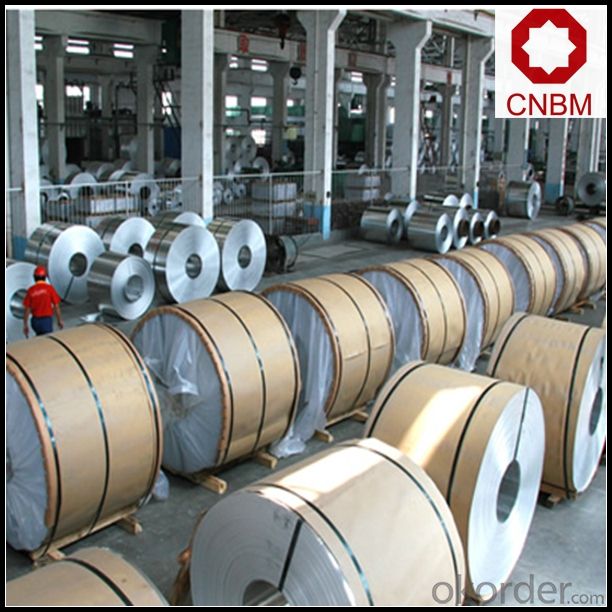Aluminum Foil Coil Stock in Large Quantity
- Loading Port:
- Shanghai
- Payment Terms:
- TT OR LC
- Min Order Qty:
- 5 m.t.
- Supply Capability:
- 10000 m.t./month
OKorder Service Pledge
OKorder Financial Service
You Might Also Like
Item specifice
1. Specification of Aluminum Foil Coil Stock in Large Quantity
1) Alloy | 1050, 1060,1100, 3003 3004 3105 3A21 5005 5052 etc |
2) Temper | O/H12/H14/H1/H18/H32/H34/H36/H38//H111/H112/H116/H321/T6/T651/T3/T351 etc |
3) Thickness | 0.1mm to 6mm |
4) Width | 20mm to 3300mm |
5) Coil weight | 100kgs to 6 tons depends on actual requirement |
6) Core material | Aluminum or paper |
7) Coil Inner diameter | 75mm, 150mm, 200mm, 300mm, 405mm, 505mm or as required |
8) Protective film can be added
2. Application of Aluminum Foil Coil Stock in Large Quantity
(1).Interior: wall cladding, ceilings, bathrooms, kitchens and balconies, shutters, doors...
(2).Exterior: wall cladding, facades, roofing, canopies, tunnels,column covers , renovations...
(3).Advertisement: display platforms, signboards, fascia, shop fronts...
3. Feature of Aluminum Foil Coil Stock in Large Quantity
*Such coil is specially designed to replace aluminum ingot, due to the high export tax of aluminum ingot, the coil has better price than ingot.
*This type of coil can fit customer's remelting furnace just like ingot, no need to make any change to the production line that was previously used for ingot. The standard coil size and weight is very suitable for the feed gate of furnace.
*This type of coil causes less material wastage than ingot when remelted.
*Our coil is made directly from ore, no need to go though the ingot making process, quality is much better than other suppliers who use ingot scrap to make coil.
Be free from Oil Stain, Dent, Inclusion, Scratches, Stain, Oxide Dicoloration, Breaks, Corrosion, Roll Marks, Dirt Streaks and other defect which will interfere with use
4. Certificate:
SGS and ROHS(if client request, paid by client), MTC(plant provided), Certificate of Origin(FORM A, FORM E, CO), Bureau Veritas and SGS (if client request, paid by client), CIQS certificate
5. Image of Aluminum Foil Coil Stock in Large Quantity



6. Package and shipping of Aluminum Foil Coil Stock in Large Quantity
eye to wall
eye to the wall
with wood pallet (wooded case also available)
7. FAQ of
1) What is the delivery time?
Dpends on actual order, around 20 to 35 days
2)What is the QC system:
We have QC staff of 20 persons and advanced equipment, each production is with MTC traced from Aluminum ingot lot.
3) What market do you mainly sell to?
Australia, America, Asia, Middle East, Western Europe, Africa etc
- Q:What is the bending radius for aluminum coils?
- The bending radius of aluminum coils is subject to variation depending on various factors, including the thickness and temper of the aluminum, as well as the specific alloy employed. In general, aluminum coils possess a high level of ductility and malleability, enabling them to be bent to a relatively tight radius in comparison to other materials. Nonetheless, it is crucial to refer to the manufacturer's guidelines or specifications for the particular aluminum coil in use to ascertain the recommended bending radius. Doing so will guarantee that the bending procedure remains within the material's limits, preventing any undesirable deformation or damage.
- Q:Can aluminum coils be used in the manufacturing of lighting fixtures?
- Yes, aluminum coils can be used in the manufacturing of lighting fixtures. Aluminum is a lightweight and durable material that is commonly used in various industries, including the lighting industry. It offers excellent heat dissipation properties, making it suitable for fixtures that generate heat, such as LED lights. Additionally, aluminum coils can be easily shaped and molded into different designs, making them a versatile choice for lighting fixture production.
- Q:Can aluminum coils be painted or coated with other materials?
- Yes, aluminum coils can be painted or coated with other materials. This process is commonly done to enhance the appearance, protect against corrosion, or improve thermal insulation properties of the coils.
- Q:What is the maximum coil weight for aluminum coils?
- The maximum coil weight for aluminum coils can vary depending on various factors such as the thickness and width of the coil, as well as the specific alloy being used. Generally, the maximum coil weight for aluminum coils ranges from around 5,000 to 25,000 pounds. However, it is important to note that these figures are approximate and can differ depending on the manufacturer's guidelines and equipment capabilities. Additionally, it is always recommended to consult the manufacturer or supplier for specific coil weight limitations to ensure safe handling and transportation.
- Q:What happened to the aluminum coil coming out of the annealing furnace?
- There is oil on the aluminum coil and the annealing time is too long.
- Q:Can aluminum coils be used in chemical processing plants?
- Indeed, chemical processing plants can utilize aluminum coils. Aluminum, a versatile and extensively employed substance across multiple industries, including chemical processing, boasts exceptional resistance to corrosion. Consequently, it proves apt for the manipulation and conveyance of diverse chemicals. The application of aluminum coils extends to heat exchangers, condensers, evaporators, and other chemical processing equipment. Moreover, aluminum coils boast a lightweight nature and exhibit high thermal conductivity, promoting efficient heat transfer and energy conservation. Nevertheless, it remains crucial to carefully evaluate the specific demands and compatibility of the chemicals being processed to ascertain the suitability of aluminum coils for the intended use.
- Q:Can aluminum coils be used in the manufacturing of beverage cans?
- Yes, aluminum coils can be used in the manufacturing of beverage cans. Aluminum coils are commonly used in the production of beverage cans due to their lightweight, corrosion-resistant, and malleable properties. These coils are processed and shaped into cans during the manufacturing process, providing a durable and cost-effective solution for packaging beverages.
- Q:What is the role of aluminum coils in the construction of power plants?
- Aluminum coils play a crucial role in the construction of power plants, especially in the cooling systems. The main purpose of these coils is to facilitate heat transfer and maintain efficient cooling within the power plant. Power plants generate a significant amount of heat during the process of converting fuel or other energy sources into electricity. To prevent overheating and ensure optimal performance, cooling systems are installed to dissipate this excess heat. Aluminum coils are a key component of these cooling systems. The aluminum coils are typically used in the construction of air-cooled condensers and evaporators, which are integral parts of the cooling systems. These coils allow for the transfer of heat from the plant's equipment to the surrounding air. They are designed to efficiently transfer and dissipate heat by utilizing the high thermal conductivity of aluminum. The use of aluminum coils offers several advantages in power plant construction. Firstly, aluminum is a lightweight material, making it easier to handle and install in large-scale power plants. This helps reduce construction time and costs. Additionally, aluminum is highly resistant to corrosion, ensuring the longevity and durability of the coils even in harsh operating conditions. Furthermore, aluminum coils provide excellent heat transfer capabilities. They have a high thermal conductivity, meaning they can efficiently transfer heat from the power plant equipment to the cooling medium, typically air. This allows the power plant to maintain stable operating temperatures and prevent any equipment failures or performance issues caused by excessive heat buildup. Overall, aluminum coils are essential components in power plant construction, primarily in the cooling systems. They enable efficient heat transfer, promote optimal cooling, and contribute to the overall performance and reliability of the power plant.
- Q:Are aluminum coils suitable for architectural cladding?
- Architectural cladding can indeed utilize aluminum coils. Aluminum, a versatile and aesthetically pleasing material, is widely used in the construction industry due to its lightweight nature and durability. Aluminum coils can be easily shaped into various forms and sizes, making them perfect for architectural cladding applications. One of the notable advantages of using aluminum coils for cladding is their resistance to corrosion. Aluminum naturally develops a protective oxide layer, preventing rusting and deterioration over time. Consequently, aluminum proves to be a durable and low-maintenance option for architectural cladding. Moreover, aluminum coils offer a wide array of finishes and colors, providing greater design flexibility. Architects and designers can paint or coat them to match any architectural style or design concept, making aluminum coils a favored choice. Furthermore, aluminum is an environmentally friendly material. It is fully recyclable and has a significantly lower carbon footprint compared to cladding materials like steel or concrete. This makes aluminum coils a sustainable option for architectural projects. To sum up, aluminum coils are indeed suitable for architectural cladding due to their durability, corrosion resistance, design flexibility, and environmental benefits.
- Q:The choice between Vinyl and Aluminum? By Mastercraft Exteriors
- Are you asking what I think is better? It really depends on your house your neighborhood and your pocket book. I myself prefer vinyl. Aluminum will dent. A stone from the lawn mower can dent it. Not everytime but it can and over time I guarantee it will. So will that baseball the neighborhood kid throws, (because your child would never do that). Both should be available in the insulation backed version of the product if not through them then through another contractor. So if R-values are a deciding factor you can get about the same from either product. There is a lot more versatility with vinyl around windows and corners.
1. Manufacturer Overview |
|
|---|---|
| Location | |
| Year Established | |
| Annual Output Value | |
| Main Markets | |
| Company Certifications | |
2. Manufacturer Certificates |
|
|---|---|
| a) Certification Name | |
| Range | |
| Reference | |
| Validity Period | |
3. Manufacturer Capability |
|
|---|---|
| a)Trade Capacity | |
| Nearest Port | |
| Export Percentage | |
| No.of Employees in Trade Department | |
| Language Spoken: | |
| b)Factory Information | |
| Factory Size: | |
| No. of Production Lines | |
| Contract Manufacturing | |
| Product Price Range | |
Send your message to us
Aluminum Foil Coil Stock in Large Quantity
- Loading Port:
- Shanghai
- Payment Terms:
- TT OR LC
- Min Order Qty:
- 5 m.t.
- Supply Capability:
- 10000 m.t./month
OKorder Service Pledge
OKorder Financial Service
Similar products
New products
Hot products
Hot Searches
Related keywords





























